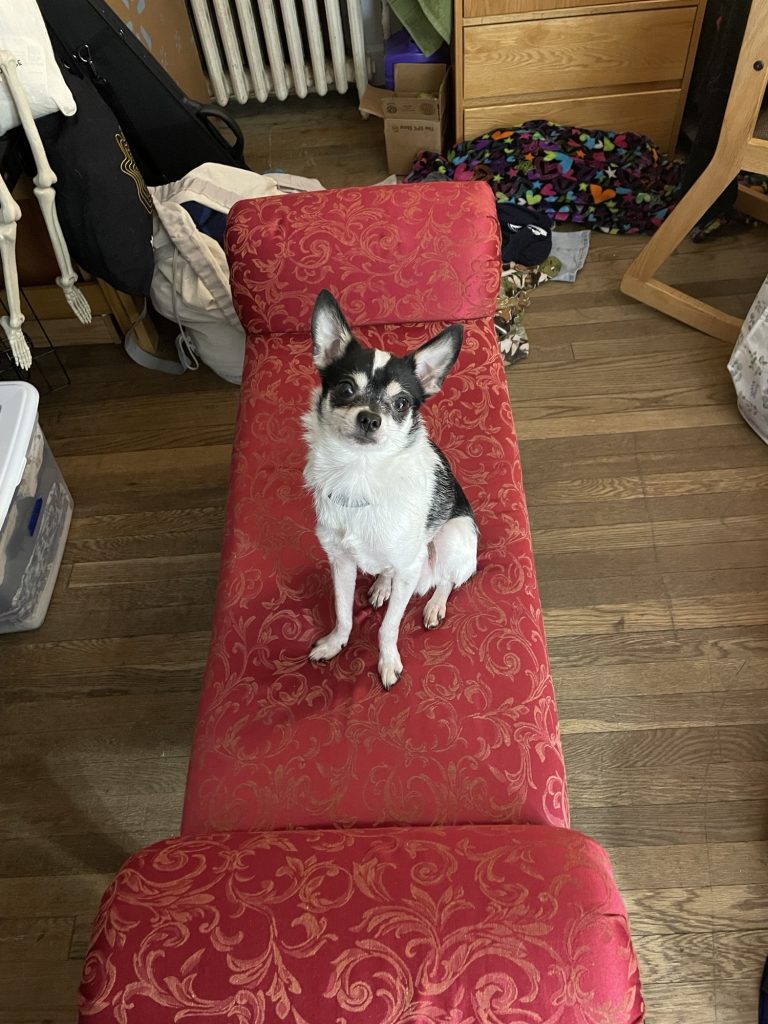By Jesse Farrar
Hi, my name is Jesse Farrar, I use he/him pronouns, and I’m an intern at Art Spark. I’m working on Art Spark’s TikTok page. I’m also a student at Bennington College.
![[ID: Jesse, an androgynous white man with long brown hair, looks into the camera. He is wearing a blue hat and skirt, and holding a cane.]](https://www.artsparktx.org/wp-content/uploads/Image-17-733x1024.jpeg)
When I was growing up in Texas, I had three siblings, two of whom are the same age as I and one who’s older. We all tended towards our own niches within the family, and as I grew older, I defined myself as the chill, low maintenance child. I was happy with whatever. I was supportive of my siblings. I was healthy. And I most certainly did not need help or attention.
That began to change in high school. I made my own friends, and, separate from the family unit, I began to realize that maybe everything wasn’t okay. My friends provided a stark contrast to my mental state, leading me to realize that I was in fact a deeply anxious person. I simply hadn’t realized because when I compared myself to my siblings and my parents, I was calm and definitely not anxious. My stability had just been an illusion.
I have always thought that I was completely able-bodied. I had this notion, as most able-bodied people do, that I was somehow immune to injury. There was a force-field around my body, reinforced only by the fact that I wasn’t disabled yet. It’s not really something I was conscious of, just a fact of my continued existence. I’m the center of my own universe, I’m the main character, I’m the cameraman (and the cameraman always lives). It’s a pretty commonly held subconscious belief.
Anyways, I just started using a cane. And so, the illusion of my able-bodiedness comes to rest in the same grave as the illusion of my mental stability.
Since beginning to use a cane, I find myself coming back to the same question over and over. What does it mean to be disabled? And within that question is a smaller, more vulnerable question. Do I count as disabled? Do I belong?
My logical side is conflicted over this. As I mentioned before, I have three siblings, two of whom have severe hEDS (Hypermobile Ehlers-Danlos Syndrome). They’re both ambulatory wheelchair users, and they both self-identify as disabled. I see them navigate the world and talk about their pain, and my brain decides that since my issues aren’t as severe, I must be able-bodied! My brain likes to ignore the fact that I do still have those issues.
There is so much shame and stigma surrounding mobility aids of all kinds. I walked to the post office with my cane, and I felt like people were looking at me, judging why I’d even need one if I “look fine.” I’m nervous to go places with it. I’m internally beating myself up for using one at all because I could technically walk without one. The culture of treating mobility aids as a last resort has seeped into my brain, and all it’s doing is harm. I remember my sister told me once about a conversation with our mom about wheelchairs, where my mom was vehemently against her using one because that would mean she’s “given up on walking.” In what world would it be better to tough through pain when there are tools and options readily available to mitigate that pain? The mindset makes no sense, and yet it keeps coming back.
I am not able-bodied. I have a fainting problem, and hypermobility, and my knees kinda suck sometimes. Sometimes I need help. Using a cane helps me. Unlearning my shame around help and reliance on tools and other people has been hard, and it will continue to be hard for the rest of my life. It’s in my nature, and in the nature of America itself (yay hyper individualism). I am learning to accept all the facets of myself, not just the facets of what I think I know about myself. I still don’t know if I count as disabled, and maybe that’s okay for now. I can keep working on the smaller parts. The whole will emerge on its own.
Jesse Farrar is a sophomore at Bennington College, studying History and Performing Arts. He enjoys knitting, writing, and going on walks with his favorite step dog rat child Pluto.

